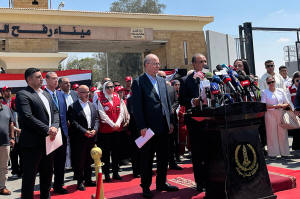Hamas accepts an Arab ceasefire proposal on Gaza as Palestinian death
toll passes 62,000
[August 19, 2025]
By VICTORIA EASTWOOD, SAMY MAGDY and MELANIE LIDMAN
RAFAH, Egypt (AP) — Hamas said Monday it has accepted a new proposal
from Arab mediators for a ceasefire in the Gaza Strip as Israel
indicated its positions haven't changed, while Gaza's Health Ministry
said the Palestinian death toll from 22 months of war has passed 62,000.
U.S. President Donald Trump appeared to cast doubt on the long-running
negotiations that Washington has mediated as well. “We will only see the
return of the remaining hostages when Hamas is confronted and
destroyed!!! The sooner this takes place, the better the chances of
success will be,” he posted on social media.
Israel announced plans to reoccupy Gaza City and other heavily populated
areas after ceasefire talks appeared to break down last month, raising
the possibility of a worsening humanitarian catastrophe in Gaza, which
experts say is sliding into famine.
Plans to expand the offensive, in part aimed at pressuring Hamas, have
sparked international outrage and infuriated many Israelis who fear for
the remaining hostages taken in the Oct. 7, 2023, attack that started
the war. Hundreds of thousands took part in mass protests on Sunday
calling for their return.
Egypt says Witkoff invited to join talks
Egyptian Foreign Minister Badr Abdelatty said mediators are “exerting
extensive efforts” to revive a U.S. proposal for a 60-day ceasefire,
during which some of the remaining 50 hostages would be released and the
sides would negotiate a lasting ceasefire and the return of the rest.
Abdelatty told The Associated Press they are inviting U.S. envoy Steve
Witkoff to join the ceasefire talks.

Abdelatty spoke to journalists during a visit to Egypt's Rafah crossing
with Gaza, which has not functioned since Israel seized the Palestinian
side in May 2024. He was accompanied by Mohammad Mustafa, the prime
minister of the Palestinian Authority, which has been largely sidelined
since the war began.
Abdelatty said Qatari Prime Minister Sheikh Mohammed bin Abdulrahman Al
Thani had joined the talks, which include senior Hamas leader Khalil al-Hayya,
who arrived in Cairo last week. Abdelatty said they are open to other
ideas, including for a comprehensive deal that would release all the
hostages at once.
Bassem Naim, a senior Hamas official, told the AP that the militant
group had accepted the proposal introduced by the mediators, without
elaborating.
An Egyptian official, speaking to the AP on condition of anonymity to
discuss the talks, said the proposal includes changes to Israel's
pullback of its forces and guarantees for negotiations on a lasting
ceasefire during the initial truce. The official said it is almost
identical to an earlier proposal accepted by Israel, which has not yet
joined the latest talks.
Diaa Rashwan, head of the Egypt State Information Service, told the AP
that Egypt and Qatar have sent the Hamas-accepted proposal to Israel.
An Israeli official said Israel’s positions, including on the release of
all hostages, had not changed from previous rounds of talks. The
official spoke on condition of anonymity because they were not
authorized to speak with the media.
Prime Minister Benjamin Netanyahu has vowed to continue the war until
all the hostages are returned and Hamas has been disarmed, and to
maintain lasting security control over Gaza. Hamas has said it will only
release the remaining hostages in exchange for a lasting ceasefire and
an Israeli withdrawal.

[to top of second column]
|

Palestinian Prime Minister Mohammed Mustafa, left on podium, and
Egyptian Foreign Minister Badr Abdelatty, center on podium, attend a
press conference during their visit to Rafah crossing between Egypt
and the Gaza Strip, Monday, Aug. 18, 2025. (AP Photo/Mayar Mokhtar)

Netanyahu said in a video addressing the Israeli public that reports of
Hamas’ acceptance of the proposal showed that it is “under massive
pressure.”
Palestinian death toll surpasses 62,000
Hamas-led militants abducted 251 people and killed around 1,200, mostly
civilians, in the attack that ignited the war. Around 20 of the hostages
still in Gaza are believed by Israel to be alive, after most of the rest
were released in ceasefires or other deals.
Gaza's Health Ministry said the Palestinian death toll from the war had
climbed to 62,004, with another 156,230 people wounded. It does not say
how many were civilians or combatants, but says women and children make
up around half the dead.
The ministry is part of the Hamas-run government and staffed by medical
professionals. The U.N. and many independent experts consider its
figures to be the most reliable estimate of wartime casualties. Israel
disputes its toll but has not provided its own.
The ministry said 1,965 people have been killed while seeking
humanitarian aid since May, either in the chaos around U.N. convoys or
while heading to sites operated by the Gaza Humanitarian Foundation, an
Israeli-backed American contractor.
Witnesses, health officials and the U.N. human rights office say Israeli
forces have repeatedly fired toward crowds seeking aid. Israel says it
has only fired warning shots at people who approached its forces. GHF
says its armed contractors have only used pepper spray or fired into the
air on rare occasions to prevent deadly crowding.
More deaths linked to malnutrition
Experts have warned that Israel's ongoing offensive is pushing Gaza
toward famine, even after it eased a complete 2 1/2-month blockade on
the territory in May. Gaza's Health Ministry said Monday that five more
people, including two children, died of malnutrition-related causes.
It says at least 112 children have died of malnutrition-related causes
since the war began, and 151 adults have died since the ministry started
tracking adult malnutrition deaths in June.
Amnesty International on Monday accused Israel of “carrying out a
deliberate campaign of starvation."

Israel has rejected such allegations, saying it allows in enough food
and accusing the U.N. of failing to promptly deliver it. U.N. agencies
say they are hindered by Israeli restrictions and the breakdown of law
and order in the territory, around three-quarters of which is now
controlled by Israel.
The U.N. World Food Program said Monday that U.N. partner organizations
reported that community kitchens in north and south Gaza produced
380,000 daily meals daily last week — far fewer than the more than 1
million daily meals they produced in April. ___
Magdy reported from Cairo and Lidman reported from Tel Aviv, Israel.
Associated Press writers Edith Lederer at the United Nations and Rod
McGuirk in Canberra, Australia contributed to this report.
All contents © copyright 2025 Associated Press. All rights reserved |